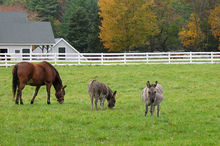In a recent study, researchers evaluated how different levels of selenium affects the immune system of adult horses. According to the researchers, the effects of selenium supplementation on the immune system has been evaluated in other species but not extensively in horses.

How selenium in horse's diet affects immune system
The study focused on whether horses grazing pasture that was marginal in selenium would react differently to vaccines, compared with horses that were supplemented with additional dietary selenium.
As reported in the Journal of Animal Science, Dr. Laurie Lawrence, animal science professor at the University of Kentucky, said the amount of selenium in soil and forages varies across the United States.
The study focused on whether horses grazing pasture that was marginal in selenium would react differently to vaccines, compared with horses that were supplemented with additional dietary selenium.
Mieke Brummer, PhD student working with the University of Kentucky and Alltech, said she was interested in the effects of selenium on the immune system, specifically the cell-mediated component of the immune system. The cell-mediated component is responsible for the activation of immune cells. These immune cells can directly attack foreign antigens.
In this experiment, twenty-eight adult horses were divided by age and sex. The horses were then randomly assigned to a dietary selenium treatment. Brummer said the first phase lasted 35-weeks. During the first phase, the researchers were aiming to deplete the selenium in the horses that were assigned to the low diet.
In the next 29-weeks, some the horses that were assigned to low treatments were given additional dietary selenium supplements. Brummer said the horses were either given organic or inorganic selenium supplements. During the last 7 weeks, the horses were given vaccinations. The researchers collected blood samples to evaluate immune response during this time.
Brummer said that the evaluation of vaccination response was not effective. She said other measures of cell-mediated immunity suggested that cell-mediated immune function was suppressed in the horses with low selenium consumption. She said antibody production was unaffected.
"It is important for horse owners to read feed labels so they can avoid both over-supplementation and under-supplementation of all classes of horses," Lawrence said.
Lawrence said the horses were not performing strenuous exercises in this study. She said the results could have been different if the horses were under performance stress. She said additional research would need to be conducted to study the interaction between selenium, antioxidant and immune response in exercising horses.
